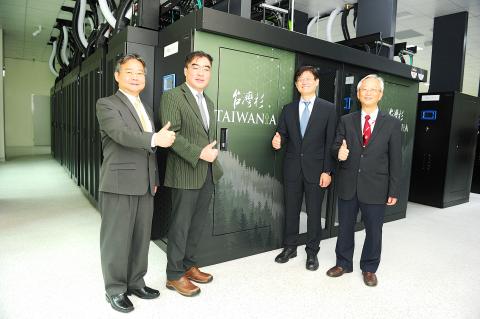The National Applied Research Laboratories (NARL) on Monday unveiled the Taiwania, the most powerful supercomputer that has yet been built indigenously for publicly funded research.
Operating at peak efficiency, Taiwania can perform up to 1.33 quadrillion floating-point operations per second (petaflops) and has 3.4 petabytes of storage, NARL National Center for High-Performance Computing official Lu Hung-fu (盧鴻復) said.
When the graphics processing units’ (GPU) capacity is added to the total computing power, Taiwania’s performance increases to 1.7 petaflops, he said.

Photo: Chien Hui-ju, Taipei Times
The supercomputer consists of 630 pure central processing units (CPUs) and 64 mixed central and graphics processing units, which boast a total of 25,200 Intel cores and 256 Nvidia P100 GPU accelators, he said.
The two-year program to build the cluster cost NT$430 million (US$14.44 million), he said.
The new supercomputer is vastly superior to the Advanced Large-scale Parallel Supercluster (ALPS) — also known as Windrider — that used to be the NARL’s most powerful cluster, he said.
Taiwania has seven times the processing power of ALPS, while its energy efficiency of 4 gigaflops per watt is an order of magnitude better, the center said.
Additionally, Taiwania’s high-density design is more volume-efficient at one-third the size of ALPS, the center said.
Taiwania is the first state-owned supercomputer to perform at petascale speeds and it was built to meet the high-performance computing needs of the nation’s research institutions, center director-general Shieh Ce-kuen said.
Taiwania has a wide range of practical applications in the simulation and analysis of complex phenomena, which facilitates biomedical research, such as gene or neurological pathway mapping, Hsieh said.
Taiwania’s computing ability will allow Taiwanese neuroscientists to scale up their neurological mapping studies from fruit fly brains of 130,000 neurons to mice brains of 70 million neurons, he said.
Such research could lead to faster medical diagnoses of hereditary conditions and deepen the understanding of neurological diseases, such as Parkinson’s and Alzheimer’s, he said.
Furthermore, Taiwania could be used for air pollution-related research and provide faster alerts for dangerous air quality conditions, he said.
Taiwania is scheduled to be activated today and private research groups may utilize the cluster for an hourly fee of NT$0.7, he said.
NARL is to decommission its older supercomputers ALPS, Iris and Formosa 5 by no later than September, he said.

The CIA has a message for Chinese government officials worried about their place in Chinese President Xi Jinping’s (習近平) government: Come work with us. The agency released two Mandarin-language videos on social media on Thursday inviting disgruntled officials to contact the CIA. The recruitment videos posted on YouTube and X racked up more than 5 million views combined in their first day. The outreach comes as CIA Director John Ratcliffe has vowed to boost the agency’s use of intelligence from human sources and its focus on China, which has recently targeted US officials with its own espionage operations. The videos are “aimed at

STEADFAST FRIEND: The bills encourage increased Taiwan-US engagement and address China’s distortion of UN Resolution 2758 to isolate Taiwan internationally The Presidential Office yesterday thanked the US House of Representatives for unanimously passing two Taiwan-related bills highlighting its solid support for Taiwan’s democracy and global participation, and for deepening bilateral relations. One of the bills, the Taiwan Assurance Implementation Act, requires the US Department of State to periodically review its guidelines for engagement with Taiwan, and report to the US Congress on the guidelines and plans to lift self-imposed limitations on US-Taiwan engagement. The other bill is the Taiwan International Solidarity Act, which clarifies that UN Resolution 2758 does not address the issue of the representation of Taiwan or its people in

US Indo-Pacific Commander Admiral Samuel Paparo on Friday expressed concern over the rate at which China is diversifying its military exercises, the Financial Times (FT) reported on Saturday. “The rates of change on the depth and breadth of their exercises is the one non-linear effect that I’ve seen in the last year that wakes me up at night or keeps me up at night,” Paparo was quoted by FT as saying while attending the annual Sedona Forum at the McCain Institute in Arizona. Paparo also expressed concern over the speed with which China was expanding its military. While the US

SHIFT: Taiwan’s better-than-expected first-quarter GDP and signs of weakness in the US have driven global capital back to emerging markets, the central bank head said The central bank yesterday blamed market speculation for the steep rise in the local currency, and urged exporters and financial institutions to stay calm and stop panic sell-offs to avoid hurting their own profitability. The nation’s top monetary policymaker said that it would step in, if necessary, to maintain order and stability in the foreign exchange market. The remarks came as the NT dollar yesterday closed up NT$0.919 to NT$30.145 against the US dollar in Taipei trading, after rising as high as NT$29.59 in intraday trading. The local currency has surged 5.85 percent against the greenback over the past two sessions, central